大学生实用英语写作Unit2
- 格式:ppt
- 大小:13.93 MB
- 文档页数:15
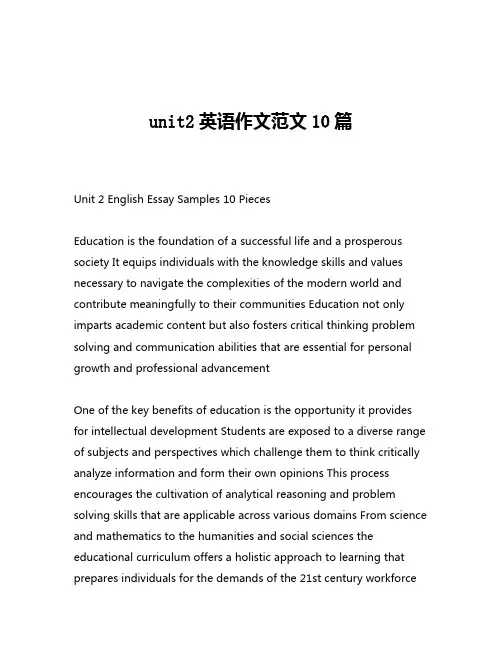
unit2英语作文范文10篇Unit 2 English Essay Samples 10 PiecesEducation is the foundation of a successful life and a prosperous society It equips individuals with the knowledge skills and values necessary to navigate the complexities of the modern world and contribute meaningfully to their communities Education not only imparts academic content but also fosters critical thinking problem solving and communication abilities that are essential for personal growth and professional advancementOne of the key benefits of education is the opportunity it provides for intellectual development Students are exposed to a diverse range of subjects and perspectives which challenge them to think critically analyze information and form their own opinions This process encourages the cultivation of analytical reasoning and problem solving skills that are applicable across various domains From science and mathematics to the humanities and social sciences the educational curriculum offers a holistic approach to learning that prepares individuals for the demands of the 21st century workforceMoreover education plays a crucial role in shaping an individual s character and values Schools not only teach academic content but also instill important life skills such as teamwork responsibility and ethical decision making These attributes are essential for personal growth and for becoming a responsible and engaged member of society Education fosters the development of empathy and social awareness encouraging students to consider the perspectives of others and to contribute positively to their communitiesBeyond its impact on the individual education also has far reaching societal benefits Educated citizens are more likely to participate actively in the democratic process making informed decisions that shape the direction of their communities and countries Furthermore education is a key driver of economic development as it produces a skilled and knowledgeable workforce capable of innovation and productivity Investments in education have been shown to yield high returns in terms of economic growth and social mobility ultimately leading to a more prosperous and equitable societyHowever the value of education extends beyond its economic and political implications Education also plays a vital role in cultivating cultural understanding and appreciation By exposing students to diverse perspectives and experiences education fosters an appreciation for cultural diversity and promotes interculturaldialogue and exchange This in turn can help to break down barriers reduce prejudice and foster greater social cohesion within and across communitiesDespite the clear benefits of education access to quality education remains a significant challenge in many parts of the world Factors such as socioeconomic status geographic location and cultural norms can all impact an individual s ability to access and succeed in educational systems This disparity in educational opportunities perpetuates cycles of inequality and limits the potential for social mobility and economic development Addressing these challenges through targeted policies and interventions is crucial for ensuring that education is truly accessible to allIn conclusion education is a fundamental human right and a powerful tool for individual and societal advancement It fosters intellectual growth personal development and cultural understanding while also driving economic progress and social mobility As such investment in education should be a top priority for governments and communities around the world Ensuring that all individuals have access to high quality education is not only a moral imperative but also a strategic necessity for building a more just equitable and prosperous future。

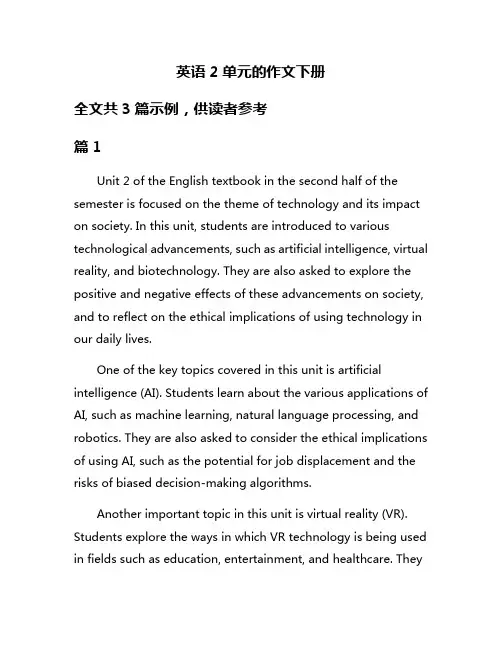
英语2单元的作文下册全文共3篇示例,供读者参考篇1Unit 2 of the English textbook in the second half of the semester is focused on the theme of technology and its impact on society. In this unit, students are introduced to various technological advancements, such as artificial intelligence, virtual reality, and biotechnology. They are also asked to explore the positive and negative effects of these advancements on society, and to reflect on the ethical implications of using technology in our daily lives.One of the key topics covered in this unit is artificial intelligence (AI). Students learn about the various applications of AI, such as machine learning, natural language processing, and robotics. They are also asked to consider the ethical implications of using AI, such as the potential for job displacement and the risks of biased decision-making algorithms.Another important topic in this unit is virtual reality (VR). Students explore the ways in which VR technology is being used in fields such as education, entertainment, and healthcare. Theyare also asked to reflect on the potential benefits and drawbacks of using VR, such as the risks of addiction and the impact on social interactions.In addition to AI and VR, students also learn about biotechnology and genetic engineering. They explore the ways in which these technologies are being used to improve human health, enhance food production, and protect the environment. They are also asked to consider the ethical dilemmas presented by these technologies, such as the risks of genetic discrimination and the potential for unintended consequences.Overall, Unit 2 of the English textbook provides students with a deep understanding of the ways in which technology is shaping our society. By exploring the benefits and drawbacks of advancements such as AI, VR, and biotechnology, students are encouraged to think critically about the role of technology in their lives and to consider the ethical implications of using technology responsibly.篇2Unit 2: Going PlacesIn Unit 2 of the English textbook, we explore the theme of "Going Places." This unit focuses on different modes oftransportation, travel experiences, and destinations around the world. Through reading passages, listening exercises, and writing prompts, students will have the opportunity to expand their vocabulary, improve their grammar skills, and practice their speaking and listening abilities.One key aspect of this unit is the emphasis on vocabulary related to travel. Students will learn words and phrases commonly used when discussing transportation, such as "boarding pass," "arrival time," and "passport control." They will also explore vocabulary related to different modes of transportation, including cars, trains, planes, and boats. By mastering this vocabulary, students will be better equipped to navigate travel scenarios and communicate effectively in English.Another important component of this unit is the exploration of travel experiences. Students will read and listen to passages about people's adventures in various destinations, from bustling cities to serene beaches. They will learn about different cultural customs, landmarks, and attractions around the world. Through these passages, students will not only improve their reading and listening comprehension skills but also gain a deeper understanding of different cultures and societies.In addition to vocabulary and travel experiences, Unit 2 also includes writing prompts that encourage students to reflect on their own travel experiences and dream destinations. Students will have the opportunity to write about memorable trips they have taken, discuss their favorite modes of transportation, and imagine future travel adventures. By engaging with these writing prompts, students will improve their writing skills, develop their creativity, and express their thoughts and ideas in English.Overall, Unit 2 of the English textbook offers a comprehensive and engaging exploration of the theme of "Going Places." Through a variety of activities and exercises, students will enhance their English language skills, broaden their knowledge of the world, and cultivate a love of travel and adventure.篇3Unit 2 of the second semester of English class has been a challenging yet rewarding experience for me. This unit focused on improving our writing and speaking skills through various exercises and activities.One of the key points we covered in this unit was how to structure and organize our writing. We learned about theimportance of having a clear introduction, body, and conclusion in our essays. We also practiced different types of writing such as descriptive, narrative, persuasive, and expository essays. By doing so, I was able to broaden my writing skills and feel more confident in expressing my ideas and opinions.In addition to writing, we also worked on improving our speaking skills. We had regular speaking exercises where we had to present on various topics in front of the class. This helped me become more comfortable speaking in public and improved my ability to articulate my thoughts clearly and effectively.Another highlight of this unit was the group project we had to work on. We were tasked with researching a topic of our choice and presenting our findings to the class. This project not only allowed us to work collaboratively with our classmates but also gave us the opportunity to further develop our research and presentation skills.Overall, Unit 2 of the second semester of English class has been a valuable learning experience for me. I have seen significant improvement in both my writing and speaking skills, and I am excited to continue honing these skills in the future. I am grateful for the support and guidance of my teacher andclassmates throughout this unit, and I am confident that the skills I have gained will serve me well in the future.。
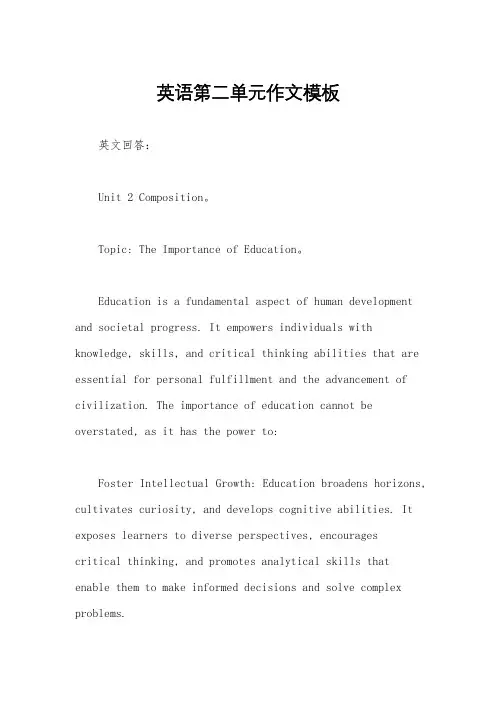
英语第二单元作文模板英文回答:Unit 2 Composition。
Topic: The Importance of Education。
Education is a fundamental aspect of human development and societal progress. It empowers individuals with knowledge, skills, and critical thinking abilities that are essential for personal fulfillment and the advancement of civilization. The importance of education cannot be overstated, as it has the power to:Foster Intellectual Growth: Education broadens horizons, cultivates curiosity, and develops cognitive abilities. It exposes learners to diverse perspectives, encouragescritical thinking, and promotes analytical skills that enable them to make informed decisions and solve complex problems.Develop Essential Skills: Education providesindividuals with practical knowledge and skills that are necessary for success in life and work. These include literacy, numeracy, communication skills, technical abilities, and social-emotional skills that empower individuals to navigate personal and professional challenges effectively.Nurture Values and Ethics: Education plays a crucial role in shaping values, ethics, and moral principles. It teaches learners about history, culture, and the importance of responsible citizenship. By fostering empathy, compassion, and a sense of community, education promotes ethical behavior and creates a more harmonious society.Promote Economic Prosperity: An educated workforce is a key driver of economic growth. Education provides individuals with the knowledge, skills, and adaptability required to meet the demands of the modern economy. It enhances productivity, innovation, and competitiveness, leading to higher earning potential and a more prosperoussociety.Foster Social Mobility: Education creates opportunities for social mobility and reduces inequalities. It provides individuals from disadvantaged backgrounds with the necessary tools to break the cycle of poverty and achieve a better quality of life. By leveling the playing field, education promotes a more just and equitable society.Conclusion。
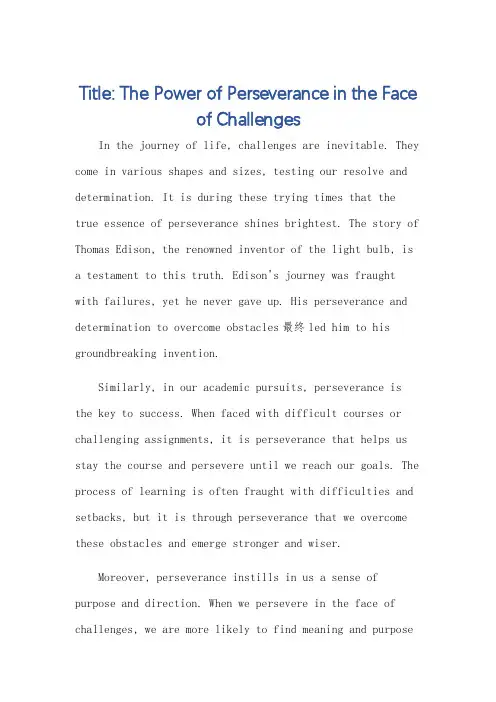
Title: The Power of Perseverance in the Faceof ChallengesIn the journey of life, challenges are inevitable. They come in various shapes and sizes, testing our resolve and determination. It is during these trying times that the true essence of perseverance shines brightest. The story of Thomas Edison, the renowned inventor of the light bulb, is a testament to this truth. Edison's journey was fraught with failures, yet he never gave up. His perseverance and determination to overcome obstacles最终led him to his groundbreaking invention.Similarly, in our academic pursuits, perseverance is the key to success. When faced with difficult courses or challenging assignments, it is perseverance that helps us stay the course and persevere until we reach our goals. The process of learning is often fraught with difficulties and setbacks, but it is through perseverance that we overcome these obstacles and emerge stronger and wiser.Moreover, perseverance instills in us a sense of purpose and direction. When we persevere in the face of challenges, we are more likely to find meaning and purposein our efforts. This sense of purpose drives us to continue working hard, even when the going gets tough. It is this perseverance that helps us stay focused and committed to our goals, no matter how difficult they may seem.However, perseverance does not mean stubbornly sticking to one path regardless of obstacles. Instead, it involves a flexible and adaptive approach to problem-solving. We must be willing to learn from our failures, adjust our strategies, and try new methods when faced with challenges. This kind of perseverance is rooted in self-reflection and continuous improvement, rather than stubbornness or rigidity.In conclusion, perseverance is a critical component of success in both our academic and personal lives. It is the driving force that helps us overcome challenges, stay focused on our goals, and learn from our failures. As we continue to face challenges and obstacles in our lives, let us remember the power of perseverance and use it as a guiding light to guide us towards success.**中文内容:****坚持的力量:面对挑战的无畏前行**在人生的旅途中,挑战是不可避免的。
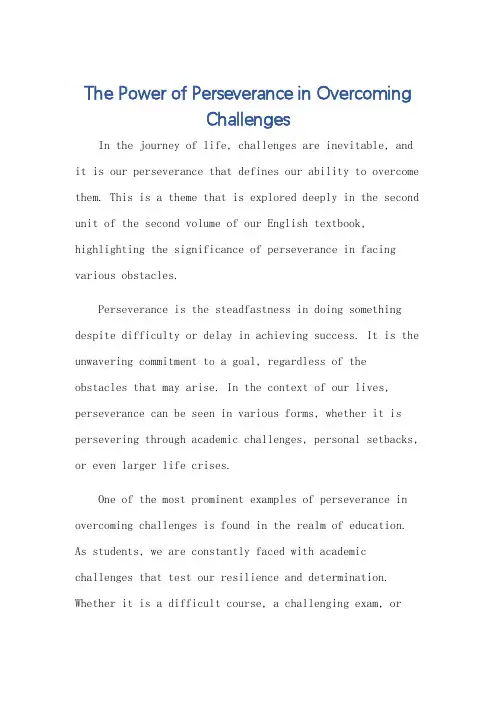
The Power of Perseverance in OvercomingChallengesIn the journey of life, challenges are inevitable, and it is our perseverance that defines our ability to overcome them. This is a theme that is explored deeply in the second unit of the second volume of our English textbook, highlighting the significance of perseverance in facing various obstacles.Perseverance is the steadfastness in doing something despite difficulty or delay in achieving success. It is the unwavering commitment to a goal, regardless of the obstacles that may arise. In the context of our lives, perseverance can be seen in various forms, whether it is persevering through academic challenges, personal setbacks, or even larger life crises.One of the most prominent examples of perseverance in overcoming challenges is found in the realm of education. As students, we are constantly faced with academic challenges that test our resilience and determination. Whether it is a difficult course, a challenging exam, orsimply the pressure to perform well, perseverance is what helps us to push through and achieve our goals.In the second unit of our textbook, we encounterstories and narratives that underscore the importance of perseverance. These stories often involve characters who face significant obstacles but refuse to give up. They persevere through the difficulties, learning from their mistakes, and ultimately achieving their goals. These narratives serve as powerful reminders that with perseverance, anything is possible.However, perseverance is not just about never giving up. It is also about adapting and finding new ways to approacha problem when faced with roadblocks. In the world of today, where change is the only constant, perseverance requires a flexible mindset and the ability to pivot when necessary. This is another crucial lesson that is emphasized in the second unit of our textbook.Moreover, perseverance is closely linked to self-belief and positive mindset. Believing in oneself and maintaininga positive attitude during challenging times can greatly enhance one's ability to persevere. When faced withobstacles, it is essential to remember our strengths, focus on our goals, and believe that we have the power to overcome any challenge.In conclusion, the second unit of our English textbook powerfully illustrates the importance of perseverance in overcoming challenges. Whether in academics, personal life, or any other aspect of our lives, perseverance is a crucial trait that can help us to push through difficulties and achieve our goals. By maintaining a positive mindset, adapting to changes, and never giving up, we can harnessthe power of perseverance to transform obstacles into opportunities for growth and success.**克服困难的力量**在人生的旅程中,挑战无处不在,而我们的毅力决定了我们克服这些挑战的能力。
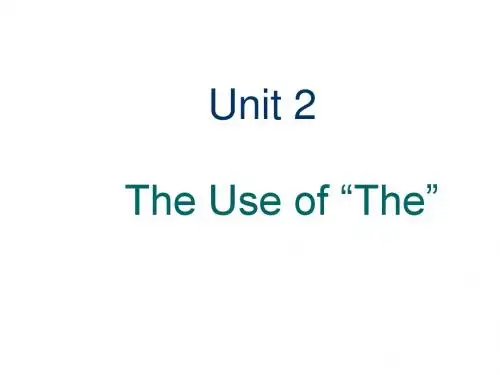
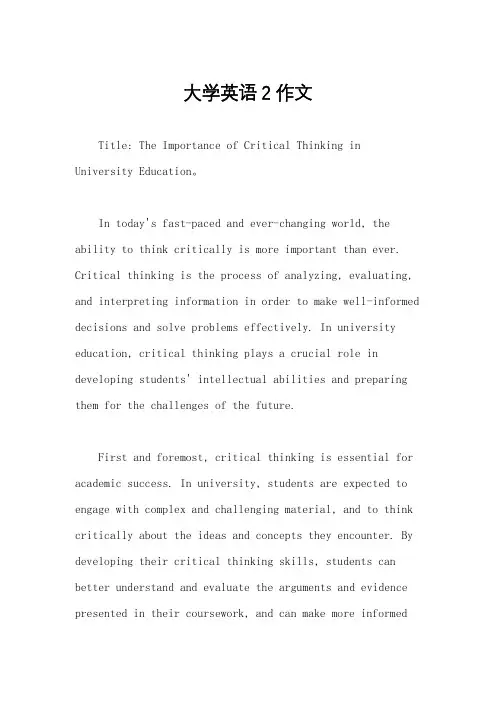
大学英语2 作文Title: The Importance of Critical Thinking inUniversity Education。
In today's fast-paced and ever-changing world, the ability to think critically is more important than ever. Critical thinking is the process of analyzing, evaluating, and interpreting information in order to make well-informed decisions and solve problems effectively. In university education, critical thinking plays a crucial role in developing students' intellectual abilities and preparing them for the challenges of the future.First and foremost, critical thinking is essential for academic success. In university, students are expected to engage with complex and challenging material, and to think critically about the ideas and concepts they encounter. By developing their critical thinking skills, students can better understand and evaluate the arguments and evidence presented in their coursework, and can make more informedand persuasive arguments of their own. This not only leadsto better academic performance, but also prepares students for the rigors of post-graduate study and professional life.Furthermore, critical thinking is a vital skill for the 21st century workforce. In today's globalized and technologically advanced economy, employers are looking for workers who can think critically, solve problems creatively, and adapt to new challenges. By developing their critical thinking skills in university, students are better prepared to meet these demands and to succeed in their chosen careers. Whether they are working in business, science, the arts, or any other field, the ability to think criticallyis a valuable asset that sets graduates apart from their peers.In addition, critical thinking is essential forinformed citizenship and civic engagement. In a democratic society, it is crucial for citizens to be able tocritically evaluate the information and arguments they encounter in the media, in political discourse, and in everyday life. By developing their critical thinking skillsin university, students can become more discerning and engaged citizens, and can contribute more effectively to public debates and decision-making processes.In conclusion, critical thinking is a fundamental skill that is essential for success in university education and beyond. By developing their critical thinking skills, students can achieve academic success, prepare for the demands of the workforce, and become more informed and engaged citizens. Therefore, it is crucial for universities to prioritize the development of critical thinking skillsin their curricula, and for students to recognize the importance of cultivating this skill throughout their academic careers. Only by doing so can we ensure that the next generation of graduates is prepared to meet the challenges of the future.。
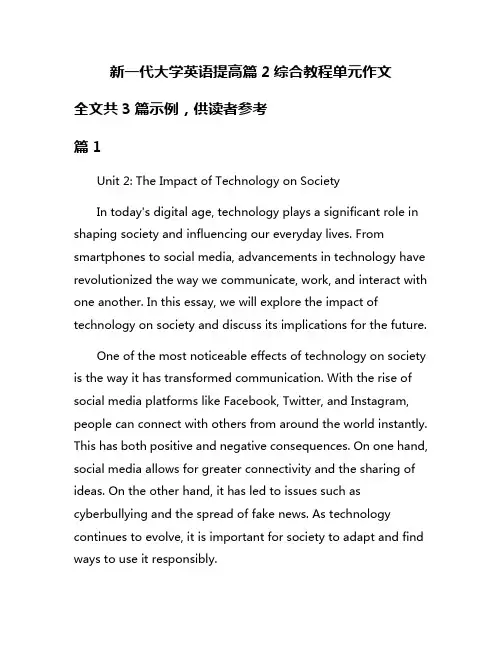
新一代大学英语提高篇2综合教程单元作文全文共3篇示例,供读者参考篇1Unit 2: The Impact of Technology on SocietyIn today's digital age, technology plays a significant role in shaping society and influencing our everyday lives. From smartphones to social media, advancements in technology have revolutionized the way we communicate, work, and interact with one another. In this essay, we will explore the impact of technology on society and discuss its implications for the future.One of the most noticeable effects of technology on society is the way it has transformed communication. With the rise of social media platforms like Facebook, Twitter, and Instagram, people can connect with others from around the world instantly. This has both positive and negative consequences. On one hand, social media allows for greater connectivity and the sharing of ideas. On the other hand, it has led to issues such as cyberbullying and the spread of fake news. As technology continues to evolve, it is important for society to adapt and find ways to use it responsibly.In addition to communication, technology has also had a profound impact on the workplace. The rise of automation and artificial intelligence has led to concerns about the future of jobs and the implications for the labor market. While some argue that technology will create new opportunities for jobs and innovation, others worry about the potential for job displacement and income inequality. As we move forward, it is crucial for society to address these challenges and find ways to ensure that the benefits of technology are shared equitably.Beyond communication and the workplace, technology has also changed the way we access information and consume media. With the rise of streaming services like Netflix and Spotify, traditional media outlets are facing new challenges in keeping up with changing consumer preferences. Additionally, the prevalence of smartphones and tablets has led to increased screen time, which has implications for both physical and mental health. As we navigate these changes, it is important for society to find a balance between the benefits of technology and the need for human connection and well-being.In conclusion, technology has had a profound impact on society, shaping the way we communicate, work, and interact with one another. While it has brought about many positivechanges, it also presents challenges that we must address in order to create a more equitable and sustainable future. By recognizing the impact of technology on society and working together to find solutions, we can harness its potential for good and build a better world for future generations.篇2The Impact of Social Media on Modern CommunicationWith the rapid development of technology, social media has become an indispensable part of our daily lives, significantly changing the way we communicate and interact with others. In this essay, I will explore the impact of social media on modern communication based on my perspective and experiences.First and foremost, social media has revolutionized the way we communicate with others, breaking down geographical barriers and allowing people from different countries and cultures to connect and exchange ideas effortlessly. Platforms such as Facebook, Twitter, and Instagram have made it easier for us to stay in touch with friends and family, share our thoughts and experiences, and even form new relationships withlike-minded individuals.Moreover, social media has also transformed the way we consume information and news. Instead of relying solely on traditional media sources such as newspapers and television, people now turn to social media for real-time updates and trending topics. This has not only democratized the flow of information but also empowered individuals to voice their opinions and participate in important discussions on various social issues.On the flip side, however, the rise of social media has also brought about certain challenges and concerns. The spread of fake news and misinformation on social media platforms has become a major issue, leading to confusion, polarization, and distrust among users. Additionally, the pervasive use of social media has raised concerns about privacy and data security, with many people feeling vulnerable to online threats andcyber-attacks.In conclusion, while social media has undoubtedly revolutionized the way we communicate and interact with others, it is essential to approach it with caution and critical thinking. By harnessing the power of social media responsibly, we can leverage its benefits to foster meaningful connections, exchange valuable information, and contribute positively to society.Overall, social media has had a profound impact on modern communication, shaping our interactions, influencing our opinions, and redefining the way we connect with the world. As we continue to navigate the ever-evolving landscape of social media, it is important to be mindful of its potential pitfalls and strive to use it as a tool for positive change and meaningful engagement.篇3The New Generation of College English Advanced Course Unit CompositionIn today's fast-paced world, the ability to communicate effectively in English is more important than ever. As a college student, mastering the English language is essential in order to succeed in your academic and professional endeavors. The New Generation of College English Advanced Course Unit is designed to help you improve your English skills and broaden your horizons.One of the key components of this course is writing. Writing is a crucial skill that is not only important in academic settings, but also in the professional world. In this unit, you will learn how to write persuasively, creatively, and effectively. You will have theopportunity to practice writing essays, reports, and other types of papers, giving you the confidence and skills you need to excel in your future endeavors.Another important aspect of this course is speaking and listening. In today's globalized world, the ability to communicate orally in English is essential. Through interactive activities, group discussions, and presentations, you will improve your speaking and listening skills, enabling you to communicate confidently and effectively in any situation.Additionally, this course will help you develop your reading and comprehension skills. In today's information age, the ability to read and interpret texts is crucial. Through reading a variety of texts, such as articles, essays, and literature, you will expand your vocabulary, improve your comprehension, and enhance your critical thinking skills.Overall, the New Generation of College English Advanced Course Unit is designed to help you become a proficient and confident English speaker. By developing your writing, speaking, listening, and reading skills, you will be well-equipped to succeed in college and beyond. So, embrace this opportunity to improve your English skills and unlock new opportunities for growth and success.。
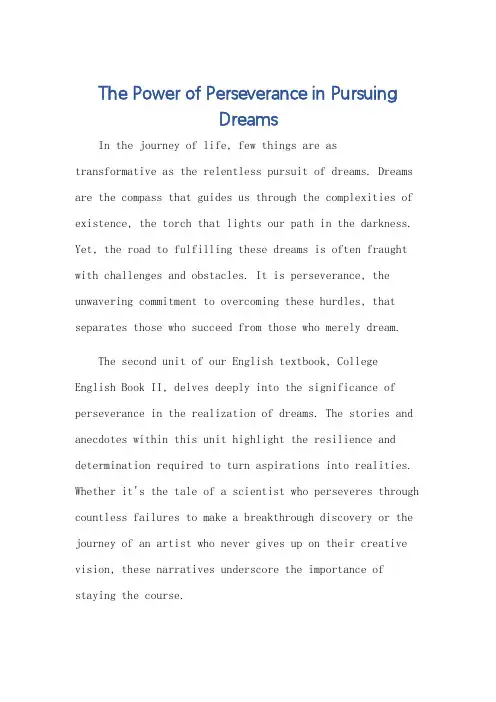
The Power of Perseverance in PursuingDreamsIn the journey of life, few things are as transformative as the relentless pursuit of dreams. Dreams are the compass that guides us through the complexities of existence, the torch that lights our path in the darkness. Yet, the road to fulfilling these dreams is often fraught with challenges and obstacles. It is perseverance, the unwavering commitment to overcoming these hurdles, that separates those who succeed from those who merely dream.The second unit of our English textbook, College English Book II, delves deeply into the significance of perseverance in the realization of dreams. The stories and anecdotes within this unit highlight the resilience and determination required to turn aspirations into realities. Whether it's the tale of a scientist who perseveres through countless failures to make a breakthrough discovery or the journey of an artist who never gives up on their creative vision, these narratives underscore the importance of staying the course.Perseverance is not merely about enduring hardships;it's about learning from each setback and using it as a stepping stone to greater heights. It's about maintaining a positive mindset, even in the face of seemingly insurmountable odds. It's about having the courage to try again, knowing that each attempt brings us closer to our goals.In today's world, where instant gratification and quick fixes often seem like the norm, perseverance might seemlike an outdated virtue. However, it is precisely this old-fashioned quality that holds the key to achieving long-term success. Dreams don't come true overnight; they require sustained effort, patience, and a willingness to keep going even when the going gets tough.Moreover, perseverance builds character and shapes us into stronger, more resilient individuals. It teaches us that true success is not measured by the number of times we fall but by the number of times we rise. It instills a sense of purpose and direction, giving us the strength to overcome self-doubt and external obstacles.As students pursuing higher education, we are at a critical juncture in our lives. We are shaping our futures, carving out our niches in the world. It is during this time that perseverance becomes even more crucial. Whether it'sin our academic pursuits, personal growth, or the pursuitof our passions, perseverance is the catalyst that turns potential into actualization.In conclusion, the power of perseverance in pursuing dreams cannot be overstated. It is the invisible force that propels us forward, that helps us turn our visions into realities. As we continue on our journey through life, let us remember that it is not the speed of our progress butthe consistency of our effort that ultimately determinesour success. Let us hold fast to our dreams and persevere, knowing that with each step we take, we are inching closerto our desired destination.**追求梦想中的坚持之力**在人生旅途中,很少有事情能像不懈追求梦想那样具有变革性。
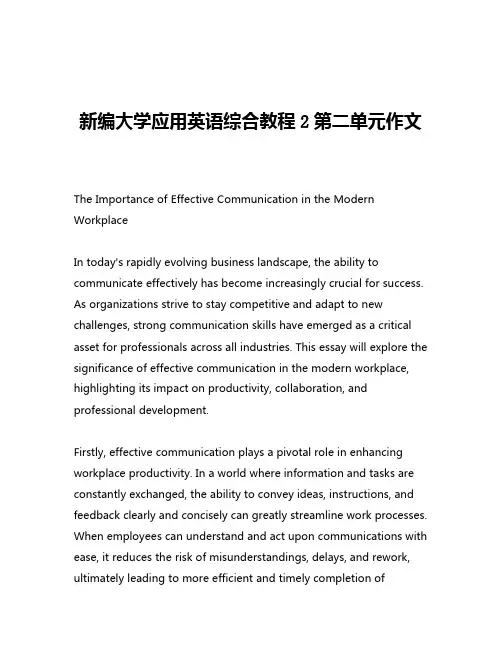
新编大学应用英语综合教程2第二单元作文The Importance of Effective Communication in the Modern WorkplaceIn today's rapidly evolving business landscape, the ability to communicate effectively has become increasingly crucial for success. As organizations strive to stay competitive and adapt to new challenges, strong communication skills have emerged as a critical asset for professionals across all industries. This essay will explore the significance of effective communication in the modern workplace, highlighting its impact on productivity, collaboration, and professional development.Firstly, effective communication plays a pivotal role in enhancing workplace productivity. In a world where information and tasks are constantly exchanged, the ability to convey ideas, instructions, and feedback clearly and concisely can greatly streamline work processes. When employees can understand and act upon communications with ease, it reduces the risk of misunderstandings, delays, and rework, ultimately leading to more efficient and timely completion ofprojects.Moreover, effective communication fosters stronger collaboration among team members. In today's increasingly interconnected work environments, where cross-functional collaboration is often essential, the ability to communicate effectively becomes a vital skill. When team members can exchange ideas, provide constructive feedback, and coordinate their efforts seamlessly, it leads to a more cohesive and productive work environment. Effective communication enables team members to align their goals, share knowledge, and work together towards common objectives, ultimately enhancing the overall performance of the organization.In addition to its impact on productivity and collaboration, effective communication also plays a crucial role in professional development. As employees navigate their career paths, the ability to communicate effectively can open doors to new opportunities, such as promotions, leadership roles, and the ability to influence key decision-makers. Professionals who can articulate their ideas clearly, present their work with confidence, and engage in productive dialogues are often viewed as valuable assets by their employers. Effective communication skills can also enhance an individual's personal brand, making them more attractive to potential employers or clients.Furthermore, effective communication is essential for building strongrelationships with colleagues, clients, and stakeholders. In the modern workplace, where interpersonal interactions are frequent and often crucial to business success, the ability to communicate with empathy, respect, and cultural sensitivity can greatly improve professional relationships. By fostering open and transparent communication, professionals can build trust, resolve conflicts, and collaborate more effectively, ultimately strengthening the overall work environment.However, it is important to note that effective communication is not a one-size-fits-all approach. Professionals must adapt their communication styles to the specific needs and preferences of their audience, whether it's a formal presentation, a team meeting, or a one-on-one conversation. This requires a deep understanding of various communication techniques, such as active listening, non-verbal communication, and the use of appropriate tone and language.In conclusion, the importance of effective communication in the modern workplace cannot be overstated. From enhancing productivity and collaboration to supporting professional development and building strong relationships, the ability to communicate effectively is a crucial skill for success in today's business environment. As organizations continue to evolve and face new challenges, the demand for professionals who can communicatewith clarity, empathy, and strategic acumen will only continue to grow. By prioritizing the development of effective communication skills, individuals and organizations can position themselves for long-term success in the ever-changing landscape of the modern workplace.。
英语第二模块第二单元的小作文英文回答:The second unit of the second module in English isabout daily routines and time management. In this unit, we learn how to describe our daily routines and talk abouttime management strategies. We also learn different ways to express frequency and duration.For example, when talking about daily routines, we can use phrases like "I usually wake up at 7 o'clock in the morning" or "I have breakfast at around 8 o'clock". We can also use words like "sometimes", "occasionally", or "rarely" to describe activities that happen less frequently. Additionally, we can use adverbs like "always" or "never"to express habits or actions that happen consistently or never happen.When discussing time management strategies, we can use phrases like "I prioritize my tasks" or "I make to-do liststo stay organized". We can also talk about the Pomodoro Technique, which involves working for a set amount of time, usually 25 minutes, and then taking a short break. This technique helps improve focus and productivity.Overall, this unit provides us with useful vocabulary and phrases to talk about our daily routines and time management. It helps us express ourselves more effectivelyin English and also encourages us to reflect on our own habits and strategies.中文回答:英语第二模块的第二单元是关于日常生活和时间管理的。
明德大学英语2单元作文English Unit 2 Essay for Mingde UniversityMingde University is an esteemed institution of higher learning that has a rich history and a reputation for academic excellence. As a student enrolled in the English language program, I have had the opportunity to delve deeper into the intricacies of the English language and explore its vast cultural and literary landscape. In this essay, I will reflect on my experiences and learnings from the second unit of the English course, highlighting the key concepts and skills I have acquired.One of the primary focuses of the second unit was on the importance of effective communication in various contexts. We explored the nuances of interpersonal communication, examining the role of nonverbal cues, active listening, and the art of constructing clear and concise messages. Through interactive workshops and case studies, I gained a deeper understanding of the factors that contribute to successful communication, such as empathy, cultural awareness, and the ability to adapt one'scommunication style to the needs of the audience.Furthermore, the unit delved into the realm of professional communication, equipping us with the necessary tools and strategies to navigate the corporate world effectively. We learned about the conventions of business writing, including the structure and formatting of emails, reports, and proposals. Mastering these skills has been invaluable, as I now feel more confident in my ability to communicate effectively in a professional setting, whether it is drafting a formal letter, delivering a presentation, or participating in a team meeting.Another crucial aspect of the second unit was the emphasis on critical thinking and analytical skills. We were challenged to engage with a variety of texts, from academic articles to literary works, and to approach them with a critical lens. By learning to identify the central arguments, evaluate the evidence, and draw insightful conclusions, I have developed a more nuanced understanding of the world around me. This skill set has not only enhanced my academic performance but has also equipped me with the ability to navigate complex issues and make well-informed decisions.Alongside the development of communication and critical thinking skills, the second unit also focused on expanding our vocabulary and improving our grammar proficiency. Through a combination ofinteractive exercises, vocabulary-building activities, and targeted feedback, I have been able to enhance my command of the English language. This newfound linguistic dexterity has not only improved my overall academic performance but has also opened up new avenues for self-expression and creative exploration.One of the most rewarding aspects of the second unit was the opportunity to engage in collaborative learning. We were encouraged to work in groups, sharing ideas, providing constructive feedback, and learning from one another. This collaborative approach not only fostered a sense of community within the classroom but also allowed me to develop essential teamwork and problem-solving skills. I have come to appreciate the value of diverse perspectives and the synergistic power of collective intelligence.Furthermore, the unit incorporated a strong emphasis on personal development and self-reflection. Through various reflective exercises and discussions, I was able to gain a deeper understanding of my own strengths, weaknesses, and learning preferences. This self-awareness has empowered me to take a more proactive approach to my academic journey, setting clear goals and developing strategies to overcome any challenges I may face.As I reflect on my experiences in the second unit of the English course, I am filled with a sense of gratitude and accomplishment. Theknowledge and skills I have acquired have not only enriched my academic pursuits but have also equipped me with the tools necessary to navigate the complexities of the modern world. I am confident that the lessons I have learned will continue to serve me well, both in my academic endeavors and in my future professional and personal endeavors.In conclusion, the second unit of the English course at Mingde University has been a transformative experience, one that has challenged me to grow, learn, and expand my horizons. Through the development of communication, critical thinking, and language proficiency, I have gained a deeper appreciation for the power of the written and spoken word. As I look ahead to the remaining units of the course, I am filled with a sense of excitement and determination, eager to continue my journey of intellectual and personal growth.。
The Power of Perseverance in the Journey ofLifeIn the vast tapestry of life, perseverance threads its way, connecting the dots of challenges and obstacles, transforming them into a mosaic of triumph and growth. The second unit of our University English reading and writing course, with its focus on resilience and determination, serves as a beacon, guiding us towards an understanding of the profound impact perseverance has on our lives.Life is not a smooth sailing journey; it is fraught with challenges and setbacks. However, it is our perseverance that propels us forward, enabling us to navigate through the treacherous waters of life. Perseverance is not merely about enduring hardships; it is about embracing them, learning from them, and rising stronger after each fall.In the academic sphere, perseverance manifests as the unwavering dedication to studies, the unyielding pursuit of knowledge, and the unrelenting effort to excel. It is the silent force that drives students to push beyond their comfort zones, to explore new areas of learning, and toovercome the challenges posed by complex subjects and demanding courses.Moreover, perseverance is not confined to the classroom; it extends to all aspects of life. Whether it is the relentless pursuit of a dream career, the unwavering commitment to a personal goal, or the dogged determinationto overcome a personal obstacle, perseverance is the glue that binds us to our aspirations and keeps us on the pathto success.However, perseverance does not come without its costs.It requires a steadfast will, an unyielding spirit, and an unwavering commitment to the end goal. It demands sacrifice, hard work, and sometimes, even heartbreak. But it is these challenges that forge our character, strengthen our resolve, and transform us into the resilient individuals we striveto be.In conclusion, perseverance is a powerful force that shapes our lives and determines our destinies. It is the driving force that propels us towards our goals, no matter how distant or unattainable they may seem. As we embark on the journey of life, let us remember that it is not thesize of the obstacle that matters, but the size of our perseverance in overcoming it. Let us embrace the challenges that come our way, learn from them, and persevere in our pursuit of success and happiness.**生活中的毅力之力**在生活的广阔画卷中,毅力以其独特的方式编织着挑战与障碍的点点滴滴,将它们转化为胜利与成长的马赛克。
Title: The Power of Perseverance inOvercoming ChallengesIn the journey of life, challenges are inevitable, and it is our perseverance that determines our success. The second unit of our university English course delves into this profound concept, exploring how perseverance can transform dreams into realities and overcome seemingly insurmountable obstacles.Perseverance is the steadfastness in doing something despite difficulty or delay in achieving success. It is the invisible force that propels us forward, even when faced with setbacks and adversity. The stories of successful individuals across various fields are testament to the power of perseverance. They are individuals who refused to give up, who believed in themselves and their dreams, and who ultimately achieved remarkable success.One such story that resonates with me is the life of Thomas Edison. Edison, the inventor of the light bulb, faced numerous failures in his attempts to create a long-lasting, efficient light source. Yet, he never lost sight of his goal and persevered through each failure, learningfrom his mistakes and refining his designs. His famous quote, "I have not failed. I've just found 10,000 ways that won't work," is a powerful reminder of the importance of perseverance in the face of challenges.In our personal lives, we encounter challenges thattest our perseverance. Whether it's striving for academic excellence, pursuing a passion or goal, or overcoming personal difficulties, perseverance is the key to overcoming these obstacles. It is the determination to keep going, even when things seem impossible or the road ahead appears dim.Moreover, perseverance helps us grow and develop as individuals. It builds resilience, strengthens our character, and teaches us valuable lessons about life. Through perseverance, we learn to adapt to changes, tothink creatively, and to find new ways to approach problems. We become more resilient and better prepared to face future challenges.However, perseverance does not mean stubbornly sticking to a single approach. It also involves the ability to recognize when a different approach is needed and to adaptaccordingly. This flexibility in perseverance is crucial in today's rapidly changing world, where problems often require innovative solutions.In conclusion, perseverance is a powerful tool that can help us overcome challenges and achieve our goals. It is a quality that can be developed and honed through practice and experience. As we navigate the challenges of life, let us remember the stories of those who persevered and achieved success. Let us draw inspiration from their examples and persevere in our own pursuits, knowing that with perseverance, we too can transform our dreams into realities.**克服挑战中的毅力力量**在人生的旅途中,挑战是不可避免的,而正是我们的毅力决定了我们能否成功。
大学英语作文2[大全五篇]第一篇:大学英语作文2我的暑假计划My Plan for Summer VacationThe longing summer vacation is approaching, it is the best part of the school year for me.I cannot let the holidays elapse(逝去)meaninglessly, my vacation should be a phase(时期、阶段)of harvest.The events in my plan should give me a sense of infinite potential.The following plan may reveal the intensity of my desire to travel, work and study in this vacation.In the first few days I want to climb Mount Hua Shan with several friends to refresh ourselves.Then I tend to visit relatives, senior school teachers and former classmates(老同学).Besides, to find out the best ways to cultivate my abilities, I will find a part time job and conduct some social investigation.In short, I want to do interesting things in the summer vacation.Whatever I do, the goal is the same: to get necessary experience, acquire knowledge and broaden my horizons.Though the six week vacation will pass away at lightning speed, its influence is bound to last long.核心剖析本文作者长句、短句交替使用。
大学英语二单元专题作文Possible essay:Effective Communication in the Workplace。
Effective communication is essential for success in the workplace. It helps employees understand their roles and responsibilities, share information and ideas, resolve conflicts, and build relationships with colleagues and customers. In this essay, I will discuss the importance of effective communication in the workplace, the barriers to communication, and the strategies for improving communication.Effective communication is important for several reasons. First, it promotes clarity and understanding. When employees communicate clearly and effectively, they can avoid misunderstandings, errors, and delays. For example,if a manager gives unclear instructions to a team, they may waste time and resources trying to figure out what to do.On the other hand, if the manager communicates clearly and provides feedback, the team can work efficiently and achieve their goals. Second, effective communicationfosters collaboration and innovation. When employees share their ideas and perspectives, they can generate newinsights and solutions to problems. For example, if a team is brainstorming ways to improve a product, they may come up with innovative ideas if they listen to each other and build on each other's suggestions. Third, effective communication builds trust and respect. When employees communicate honestly and respectfully, they can establish positive relationships with colleagues and customers. For example, if a customer complains about a product, a customer service representative who listens attentively and responds empathetically can turn a negative experience into a positive one.However, effective communication can be hindered by various barriers. These include physical barriers, such as noise, distance, and technology; psychological barriers, such as biases, stereotypes, and emotions; and linguistic barriers, such as language differences, jargon, and slang.For example, if an employee works in a noisy factory, they may not be able to hear instructions or feedback clearly.If a manager has a negative attitude towards a team member, they may not listen to their ideas or give them credit for their work. If a team includes members from different countries, they may struggle to understand each other's accents or cultural references.To overcome these barriers and improve communication, several strategies can be employed. First, employees can use clear and concise language, avoid jargon and slang, and ask for feedback to ensure understanding. Second, employees can use active listening skills, such as paying attention, clarifying, and summarizing, to show respect and empathyfor others. Third, employees can use nonverbal cues, such as eye contact, posture, and gestures, to convey confidence and sincerity. Fourth, employees can use technology tools, such as video conferencing, instant messaging, and collaboration platforms, to overcome physical barriers and enhance communication. Fifth, employees can participate in diversity and inclusion training to overcome linguistic and psychological barriers and appreciate differentperspectives and cultures.In conclusion, effective communication is crucial for success in the workplace. It promotes clarity, collaboration, and respect, and helps overcome barriers such as physical, psychological, and linguistic. By using strategies such as clear language, active listening, nonverbal cues, technology, and diversity training, employees can improve their communication skills and build stronger relationships with colleagues and customers.。